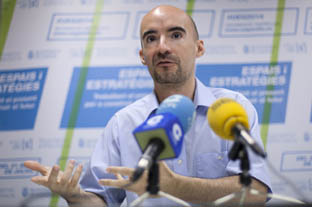
The XXXI UEG concludes on Tuesday 29 July, with a round table entitled “Strategies and municipalities”, (‘Estrategias y municipios’) that will count with the presence of the vice-principal of Participation and Territorial Projection of the UV Jorge Hermosilla. The closing act, whose entrance is free, will take place in the Events Room of the Marchioness House, in Gandia, at 8:00 p.m.
On the other hand, the UEG site held, yesterday, the presentation of two courses. Antonia Sajardo, main professor in Applied Economics of the University Institute of Welfare of the UV, is the coordinator of the course “Social sustainable entrepreneurship: social economy+ innovative idea+ ”crowdfunding””. (Emprendimiento social sostenible: economía social + idea innovadora + crowdfunding’). This course tries to analyze the social entrepreneurship through the companies and entities of social economy, concretely cooperatives, foundations and social companies. Sajardo signaled that “society carries on without knowing the framework and the methods that can be applied at the time to enterprising”. As the Economics teacher said, any moment is good to enterprise as long as the person would have motivation, a business plan and good ideas.
Regarding social entrepreneurship, Sajardo indicated that “it isn’t focused in the pure capitalist business, but socializes the non-profit benefits in foundations, cooperatives…, where the main idea is the reinvesment”. In the course the different kinds of funding will be shown, among which, the professor emphasized the crowfunding, as it is a system that short time ago was introduced in Spain and it is based on the micro-donations online, a modality that, according to the coordinator of the course, “supports a special connection between the entrepreneur and the society, changing then the culture of the big companies.” Regarding crowfounding, Sajardo indicated that “society must split up with the barriers and doesn’t have to be afraid of the unknown, as we dispose of enough tools to open horizons”.
Regarding the barriers the entrepreneur finds to generate his Company, Antonia Sajardo remarked that, in Spain, “the procedures are comparable to a desert crossing”, because of this reason she pointed that “the Administration must facilitate the red tape to enable the task to the entrepreneurs based on an economy to the service of the people and not the opposite way”.
Lastly, the Applied Economics professor highlighted one of the advantages of the entrepreneurship that, as she said, “it’s adapted to any economic system”, moreover indicated that “the entrepreneurs are proactive people and, hence know how to carry on in every situation”.
Strategic direction in the local entities scope
Jordi Llopis is a superior technician of the Analysis and Planning Service of the UV and one of the speakers of the course “Strategic management in the local entities scope: focus, process and content”, sponsored by IMELSA.
During the course, which is aimed at city councils, the assistants will learn the value of the strategic process as a reflection tool, analysis, focus and prioritization, and, also, a good local government. The speakers will explain the keys that could differentiate a good strategy from other that is not, the key aspects to be considered related to the focus to adopt. Moreover, the speakers will translate to the pupil the formulation processes that showed more efficacy and the tools and informative resources has to take on account during the reflection tasks the analysis.
Following the pointing of Llopis: “ the objective is to show the assistants a strategic planning in the public scope which is confronted to politics and reality, in a way that, sometimes, the politic intentions cannot be carried out, due to the current reality”. The idea, according to Llopis, is to look for the right mechanisms to do a coherent planning with the situation of each municipality and not to ”elaborate an electoral programme not planned according to the moment a municipality is going through.
The technician explained that the course doesn’t come into the politic part, only introducing a coherent and equalized methodology, taking into account what resources each city council has, what they must do with the organizations with which it counts or which valuable purpose to carry out in front of the users, all with the final aim of “social and economic development or the reduction of the unemployment rank, between other actuations”.
The problem in which Llopis insisted was “the reactive position of the vast majority of the town councils that did not think about crisis such as that and, hence, have tended to react without an ideal strategic plan to follow”. Lastly, in response to the question that if there is any ideal strategic plan, or model to follow, the technician of the Service of Analysis and Planning concluded that “certain plans that have a very good planning but that do not develop properly as a consequence of the public associations’ own nature’.
Last update: 29 de july de 2014 08:47.
News release



















